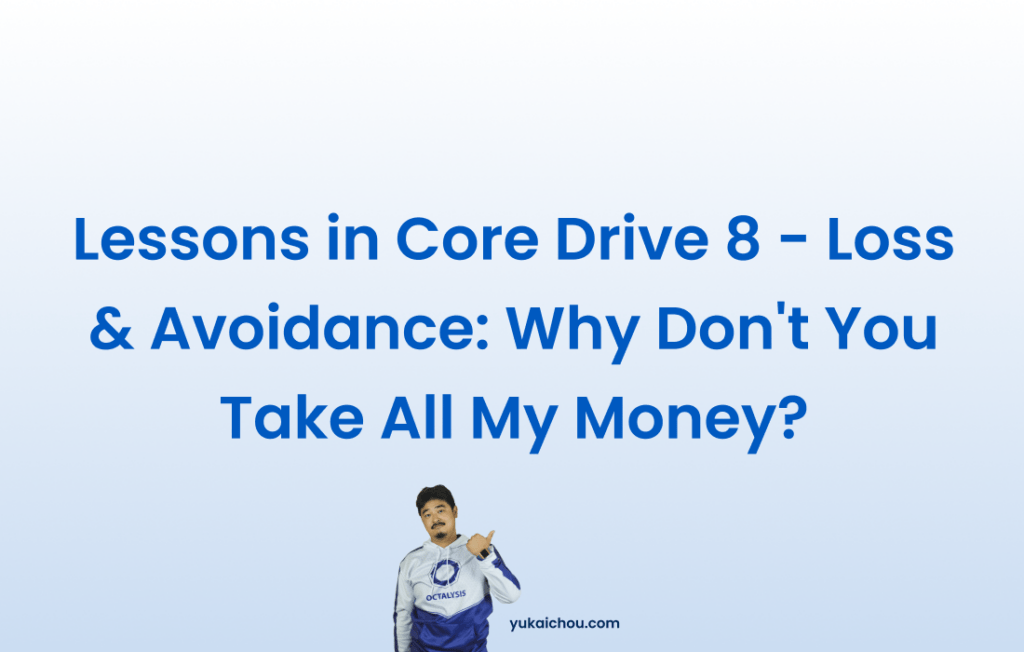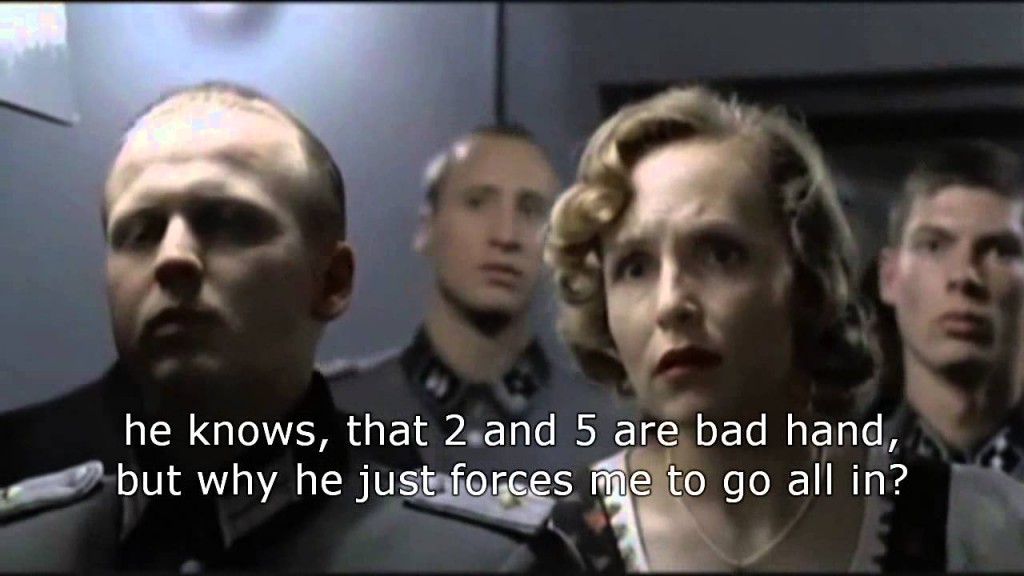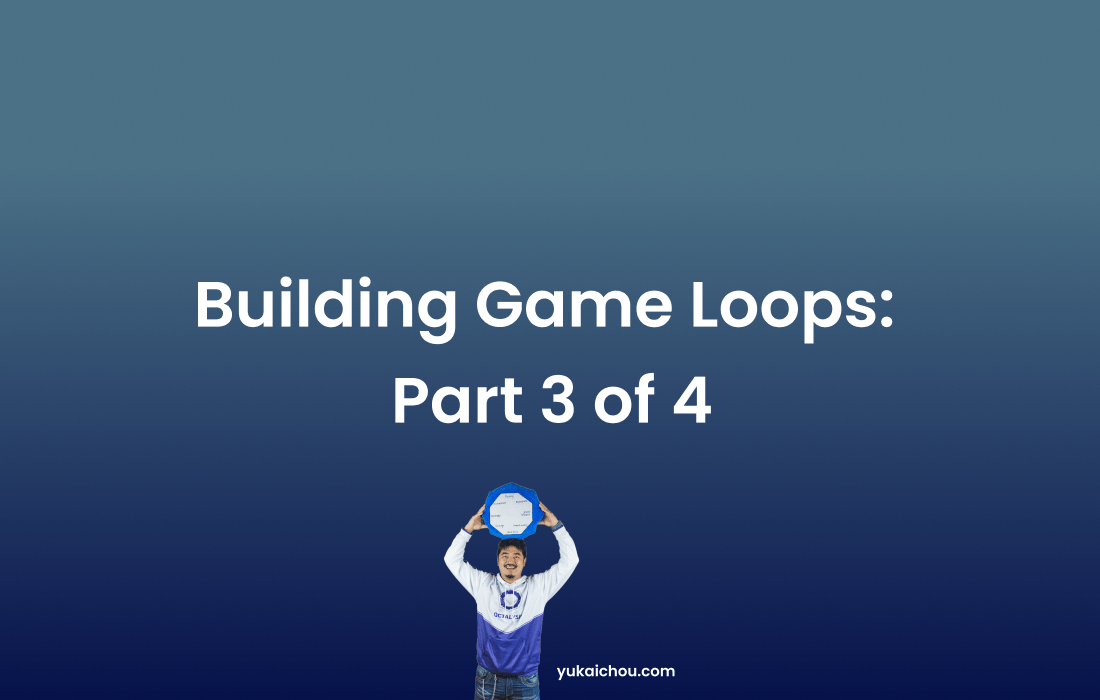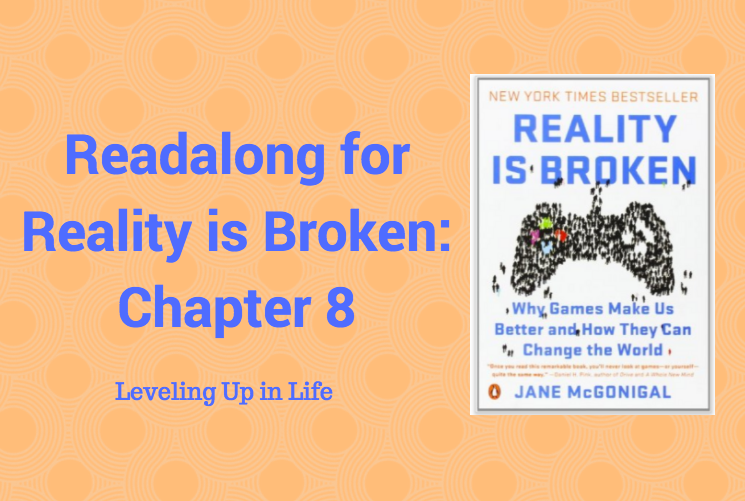“Why don’t you take all my money?” in Poker
The same type of Core Drive 8 behavior happens frequently in psychological wagering games such as poker. Consider the following situation in which many Texas Hold’em Poker players often find themselves:
At the beginning of a match, you may start off with a very strong hand, or set of cards. In order to avoid scarring off other players, you increase the bet by a small amount, so that anyone who has some hope of improving their hand in the current match stays. As more community cards (center cards that everyone can use and “share” to build their hands) are flipped, your hand remains strong and everyone continues to call your small bet by adding little increments to the pot. This often means that the players are not confident with their own cards, but they don’t want to fold (give up) yet in the hope of getting a better hand, so they keep putting in the minimum amount of money to stay in the round.
You continue to feel very good about your hand, especially compared to your opponents. Finally, when the last center card is turned over and there is nothing more to see or hope for, you feel like it is time to reap your winnings. But knowing that everyone else likely has weaker hands, you still don’t want to scare the entire table off. So you decide to put 40% of your chips in and see if anyone will challenge you with the same amount. You hope to get someone with a semi-decent hand to think that perhaps you are bluffing and bet against you.
With such a show of strength, most people fold because they are aware that you truly have a strong hand and they only have mediocre ones. But one individual suddenly goes “All-In” and pushes all his chips into the center.
This is a difficult moment for a poker player. You have already demonstrated full confidence and strength in your hand. Even if the other player also believed he had a great hand, he could simply match your bet instead of raising it. That way he could control the amount just in case your hand turns out to be stronger than his.
But by going “All-In,” this person is demonstrating that he is so confident in beating your high hand, that he doesn’t care what you might have. In poker, the worse hand a player can get is not the smallest hand at the table but the second largest hand. When you know you have a small hand, you simply fold and only lose a few chips. But when you believe you have the biggest hand at the table but ultimately don’t, you are at risk of losing all your chips.
In this scenario, you quickly do some calculations in your head and conclude that there are three possible hands that, though extremely unlikely, this other person could have to beat you with. Maybe he’s just bluffing? You become nervous and start to think about how he played his hand in the last few moves. Your rational brain becomes fully convinced that this person is not bluffing and has your hand beat. You’ve lost.
Irrational Bets based on Emotions
If you were a computer, your calculations would quickly recognize that losing 40% of your money is better than losing more than 40% of your money. And so you would fold your hand and acquiesce the loss.
However, the human mind thinks differently. In this moment, we tend to focus our eyes on the money laying on the table. We start feeling the pain of losing 40% of our chips and then start to have second thoughts: “What if he has a smaller hand? What if he is bluffing? What if he actually has a small hand, but he thinks it’s big?”
We forget that our rational brain has already determined that this person is not bluffing and has our hand beat. It’s our emotional brain that’s doing the thinking now. You also don’t want to look like a loser in front of others (Core Drive 5) after confidently raising your bets and suddenly bowing out upon the first challenge you face. Pride is an expensive thing to possess.
Finally, Core Drive 7: Unpredictability & Curiosity kicks in to elevate another aspect of Loss & Avoidance. If you fold now, you will never know if the person had a better hand (In poker, a player does not need to reveal their hand if their challenge isn’t met by an equal or higher bet). You might live the rest of your life wondering if he actually had your hand beat or not, and that’s a terrible thing to live through!
As a result, you ultimately make the irrational decision: you push in all your money, simply because you don’t want to give up on the 40% you already committed. Through this, you choose to meet your opponent’s challenge and reveal both of the hands to see whose is bigger.
Finally, as you already know in your heart, the person reveals that he actually does have a better hand than you. Instead of losing 40% of your money, you have lost it all.
This is why in poker, the term “Tough Muck” refers to the situation where players fold a very strong hand after betting a lot of money. Any player can win money when they truly have the best hand, but only true professionals know how to execute tough mucks when they need to.
The Good Chasing the Bad in Investing
The same phenomenon happens in investing too. Say you are wealthy and invested a billion dollars into a biotechnology company called LOSR. After many years, they are running out of money but have yet to reach any conclusive findings. They tell you they are very close, and just need another $400 million to make that major breakthrough.
Now if you had just become knowledgeable about this company, you might conclude that based on the traction you have seen, the executive team is completely incompetent and you wouldn’t even invest $20 in them. Why throw money down the drain?
As in the poker example, our inability to cope with sunk costs pushes us to take irrational actions – putting in good money to chase after bad money. You end up reluctantly putting the extra $400 million into LOSR in order to save the $1 billion you’ve already sunk into it.
Sure, there might be a slim chance that the company does end up making a major breakthrough, in which case the world will think you are brilliant and insightful. However, you made the investment not because of clever wit, but simply because of your fear and attachment to what was already lost.
The financially rational decision here is to cut your losses and invest your $400 million into other, more promising opportunities. (Unless, of course, you are investing for non-financial reasons – such as preventing the epic tragedy of mad scientists experimenting on themselves due to lack of funding, and becoming super-villains that destroy civilization).
True to the nature of Black Hat motivation, you are strongly compelled to take the Desired Action, but do not necessarily feel comfortable with the behavior.










6 responses to “Lessons in Core Drive 8: Loss & Avoidance – Why don’t you take all my money?”
If I could have all the money back that I threw away… Bummer. Ok. Now let’s right the ship and get on with the rest of our lives. Hopefully, a little wiser. 🙂
Short examples per Lahneman too. Most of our decision-making is emotional & not based on full logic. That suits when the situational factors are familiar & predictable. But when we approach the edge of the situation’s relevance to our assumptions, we need to call for help from the slow & methodical brain.
Lots of luck on that!
Good examples that show how people usually make decisions based on their feelings instead of being logical.
One cool thing about this course is that I am now more observant of these game techniques and core drives.
I love this analogy.
Great article 🙂
In psychology, looks like the same as staring in the Void and feeling the urge to jump.
Completely illogical, absolutely human. 😀